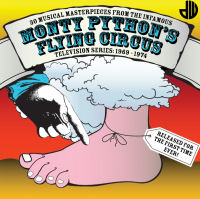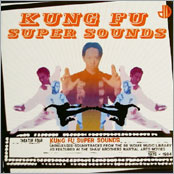Various Artists – Monty Python’s Flying Circus: 30 Musical Masterpieces (De Wolfe)

The De Wolfe vaults are clearly brimming with treasures unheard for many years. What with last year’s release of Shaw Brothers kung-fu soundtracks and the promise of a steady stream of other such gems to come, this curio comes as a revealing and welcome addition. It’s not merely for the ageing comedy fuddies, either. Brushing aside John Philip Sousa’s Liberty Bell aside, there’s an awful lot to discover here. There’s a strange mix of the pastoral and the impressionist, factoring in the odd cocktail-jazz vignette to soften the blow, and some excellently baffling, thoroughly British wind band music. It’s like a tour of eccentric Britain, but one taken under the direction of Henry Mancini.
Monty Python’s Fly Circus was, above all, a programme that delighted in the juxtaposition of stiff Britain and the over-flexible rest of the Western world. Hence, any notions of Britishness are hilariously overdone, and any notions of ‘otherness’ are coolly caricatured. The sweeping brass and Elgar-aping March Trident (composed by Jack Trombey) accompanies the Olympic Hide And Seek sketch, one that takes the conventions of BBC Olympic coverage and exacerbates its ridiculousness – something that would’ve been impossible without the posho score. That the sketch extends into a surreal Starsky & Hutch-style chase sequence replete with funk guitar is by-the-by. The Britishness needed to be suitably amped, and this stately march was the one to do it, with its trombone refrain and mass string reply.
As for the razzamatazz of the rest of the Western world in comparison to lumpy old Britain, look no further than D. Laren’s David And Goliath, which accompanied the Attila The Hun Show sketches. John Cleese’s booming narration and Michael Palin’s dodgy American accent introduce The Hun amidst stock footage of barbarian battles while the pomp of Laren’s march adds the requisite Hollywood-isms, shining the light on the terminally silly premise by approaching it with total seriousness.
Elsewhere, the metallic prangs and water sound-effects on Eye Of Horus serve as the perfect accompaniment to a nightmarish Palin sketch wherein a television presenter continually suffers from déjà vu. The opening seconds of the piece become a doom-ridden signifier that, sadly for Palin, he’s about to lose his mind. As the piece continues (not in the sketch), it becomes a slithering mood-piece with guitar tones Tarantino would wet himself over – it’s suddenly very easy to see that those behind the Flying Circus soundtrack were developed musical minds. Furthermore, harmonising clarinets and cor anglais on Towren’s Flute Promenade lend still more mockingly country garden-esque bases for the comedians to bounce from, though their composition was surely undertaken in all seriousness.
As a whole, this exhaustive compilation does more than just collect the bits you didn’t know you heard while the Pythons crawled around laying the foundations for the most overly-quoted comedy dynasty in existence. It alerts the listener to the inherent contrast in the Pythons’ cultural landmarks – they mock with seriousness, are deadpan with deadly accuracy and, more often than one might think, have the De Wolfe music library to thank for it.
—
This comes out via De Wolfe on Monday 22nd June. You can read this review at The Quietus, here.

